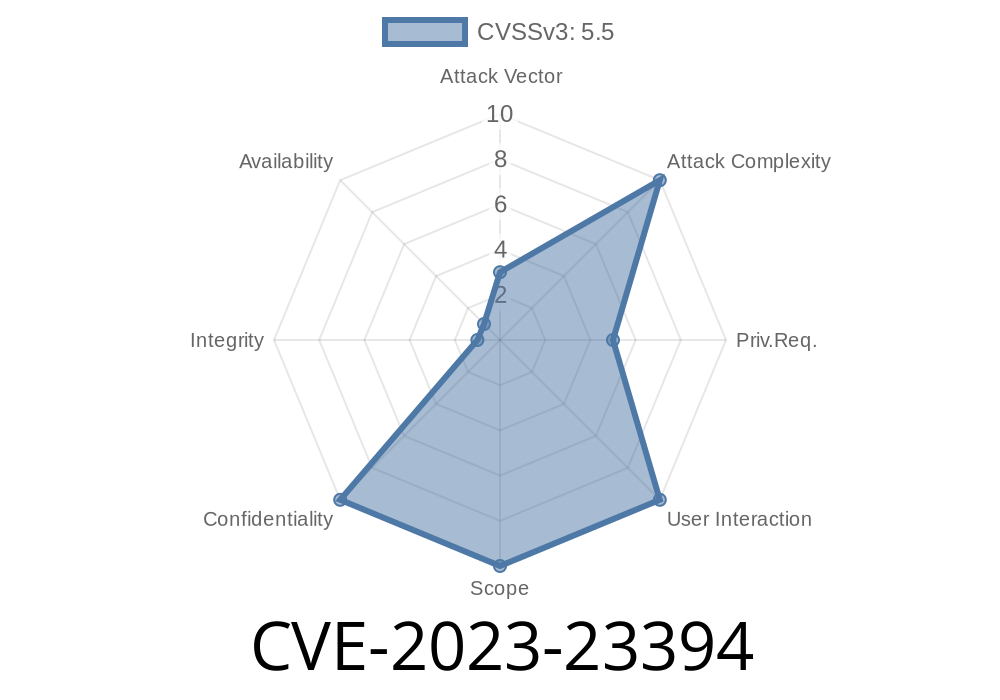In February 2023, Microsoft patched a subtle but important flaw in Windows called CVE-2023-23394. This vulnerability, found in the Client Server Run-Time Subsystem (CSRSS), was classified as an information disclosure bug. While not as flashy as a remote code execution vulnerability, this kind of bug is often used by attackers as a building block in more complex exploit chains.
In this post, we’ll explain what CVE-2023-23394 is, why it matters, how it can be exploited, and what Microsoft’s patch did. I’ll also walk you through a simplified proof-of-concept that demonstrates the bug’s essence. If you’re a blue teamer, pentester, or just someone eager to understand Windows security, this guide is for you.
What is CSRSS?
The Client Server Run-Time Subsystem (CSRSS) is a critical part of the Windows operating system. It handles console windows, thread creation, and several other low-level tasks. If you’ve ever browsed Task Manager, you’ll notice at least one csrss.exe process running, owned by SYSTEM. Because CSRSS has to interact directly with user processes and secrets, vulnerabilities here are very attractive to attackers.
Privileged component: csrss.exe (runs as SYSTEM)
- CVE Details: Microsoft CVE-2023-23394 advisory
According to Microsoft
> "A local attacker could exploit this vulnerability to gain access to information in a privileged memory context they normally would not be able to read."
Put simply, a local attacker could ask CSRSS to hand over memory contents, possibly leaking secrets like process info, tokens, or pointers – essential pieces for privilege escalation.
Let’s see why this bug existed.
CSRSS provides various services to user processes via system calls and message passing. Some messages from user-mode might not be properly checked for permissions, leading CSRSS to process them and send back information that should be restricted.
For CVE-2023-23394, attackers noticed that under certain conditions (using specially crafted requests), CSRSS would reply with memory contents from more privileged processes.
Example scenario
- An attacker’s process asks CSRSS to perform an operation intended only for admin/system processes (say, querying a handle or window station).
Who can exploit it?
Only a local attacker (must already have access to the target system).
Environment variables, file handles, or path data.
A determined attacker could use the leaked info to build a sandbox/defense bypass or facilitate further exploitation.
We won’t post a working day, but here’s a code nugget showing the *pattern*
#include <windows.h>
#include <stdio.h>
int main() {
// Open a handle to the current process's CSRSS session
// (In reality, you'd craft a specific message to CSRSS using Native APIs)
HANDLE hCsrss = OpenProcess(PROCESS_ALL_ACCESS, FALSE, /*csrss_pid*/);
if (!hCsrss) {
printf("Failed to open handle: %ld\n", GetLastError());
return 1;
}
// Simulate sending a malformed/crafted request
// For demonstration, let's say we use NtQueryInformationProcess on SYSTEM process
PROCESS_BASIC_INFORMATION pbi;
ULONG retLen = ;
NTSTATUS status = NtQueryInformationProcess(
hCsrss,
ProcessBasicInformation,
&pbi,
sizeof(pbi),
&retLen
);
if (NT_SUCCESS(status)) {
printf("Leaked information: PEB at %p\n", pbi.PebBaseAddress);
} else {
printf("Query failed with status: x%X\n", status);
}
CloseHandle(hCsrss);
return ;
}
> Note: The real exploit leverages API surface exposed by CSRSS — possibly via methods like CsrClientCallServer or direct ALPC communications. The key is abusing improper privileges checks in CSRSS’s message-handling logic.
Microsoft’s Patch
Microsoft fixed this by ensuring that CSRSS now validates the caller’s context for sensitive requests. Operations that leak privileged data now check that the requesting process has the right permissions. This prevents unprivileged users from snooping on higher-integrity data.
See the official security update
- Microsoft Security Update Guide: CVE-2023-23394
Why Does This Matter?
- Info leak bugs usually don’t get much attention, but they’re essential tools in exploit chains.
- Leaked information can help attackers defeat Address Space Layout Randomization (ASLR) or find privileged tokens.
- Attackers often combine info-leak bugs with local privilege escalation (LPE) to break out of sandboxes or bypass EDR protections.
Mitigation Steps
- Update Windows: This bug is patched in February 2023 updates for Windows 10/11 and Server 2016+.
- Least Privilege: Don’t let regular users operate important services or servers whenever possible.
- Monitor for suspicious CSRSS activity: Unusual calls or repeated failures in event logs can hint at exploitation attempts.
References & Further Reading
- Microsoft Security Advisory – CVE-2023-23394
- MITRE CVE Entry
- Windows Internals Book (MSDN)
- Ablaze Wang: CSRSS Security (external blog)
Conclusion
CVE-2023-23394 is a textbook example of how code running with the highest Windows privileges can unintentionally leak information when input validation is missing. If you’re defending Windows endpoints, always patch promptly—information disclosure bugs are the quiet helpers that make big attacks succeed.
If you want to dig deeper into Windows internals and common privilege escalation vectors, watch this space for more breakdowns – we aim to keep it simple, practical, and exclusive.
*Authored for educational & defensive research. Always act responsibly when handling security research.*
Timeline
Published on: 03/14/2023 17:15:00 UTC
Last modified on: 03/23/2023 16:59:00 UTC
